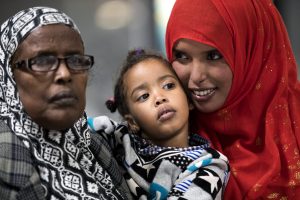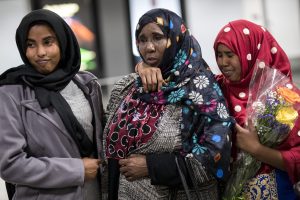Dulles, Virginia, Feb 6 (EFE).- President Donald Trump’s immigration ban initially prevented young Yemenis Tareq and Ammar from entering the US, but on Monday they left behind their anxiety and regained hope, finding the way open for them once again and finally embracing their father, a short man who awaited them at the airport trembling with joy.

The father, Aquel Mohammed Aziz, hurried to meet his sons, 19 and 21, and they buried their faces in his shoulders.
“Thanks to all the people who helped us. They’ve made me feel like we had a family. That is what I like most about the United States,” Tareq told reporters who had gathered in the Washington-Dulles international airport terminal near the nation’s capital.
On Jan. 28, the young men were left on the threshold of US entry because their plane took off just two hours after Trump’s executive order went into effect suspending admittance to refugees for 120 days and the issuing of visas to citizens from seven Muslim-majority nations, including Yemen, for 90 days.
So, upon their arrival at the Dulles airport, law enforcement officials separated Tareq and Ammar from the rest of the passengers, took their fingerprints, forced them to sign some forms and stamped the word “Cancelled” in red capital letters on the visas they had managed to acquire.
Today, however, it’s a different story.
“They’ve been very tough days,” said Tareq, who complained that on Jan. 28 he and his brother could neither get the advice of a US lawyer nor make a telephone call to be able to inform their father what had happened to them.
The boys were forced to fly back to Ethiopia, from where they had departed en route to the US. Meanwhile, their father thought that they were taking a flight with a connection at Dulles to Flint, Michigan, where he has lived since 2001.

A US citizen, Aquel has the right to claim residence for his children and, therefore, the boys followed the proper procedure a year-and-a-half ago whereby they were granted visas.
Although their visas still bear the “Cancelled” stamp, Tareq and Ammar were allowed to enter the US on Monday thanks to an agreement between an Alexandria, Virginia, court and the Trump administration authorizing their trip and promising to reinstate their visas.
“I’m so happy, this is the United States. The US is for everyone,” said Aquel, with his arms around the shoulders of his sons, who are now safe from the violence of the ongoing conflict in Yemen.
“If this had been any other country, they wouldn’t have been able to return,” said Aquel, who praised the work that attorneys around the country have been doing to reverse the effects of Trump’s travel ban.
Specifically, the US Court of Appeals for the 9th Circuit, based in San Francisco, is reviewing the legality of the ban, although on Feb. 3 it ordered a temporary nationwide suspension of the measure because of the possibility that it could cause irreparable harm to many if it remained in effect.
The legal loophole has allowed people from the seven affected nations to scramble to use the visas that have already been processed to enable them to enter the US.
